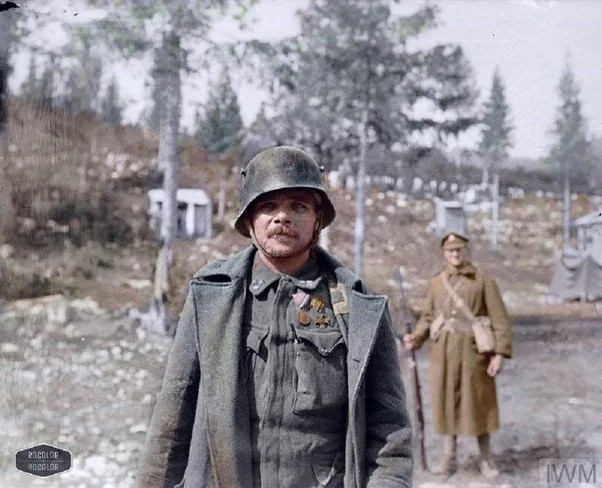Original WWI 1918 Austro-Hungarian Soldier's Handwritten Letter*








Original WWI 1918 Austro-Hungarian Soldier's Handwritten Letter*
Comes with hand-signed C.O.A.
This incredible and museum-grade WWI letter is an original 1918 dated handwritten letter by an Austro-Hungarian soldier to his family. This letter is a remarkable piece of World War I history and gives a glimpse into the personal thoughts of soldiers on the front line trenches.
The Austro-Hungarian Army played a significant role during World War I, fighting on several fronts against multiple enemy forces. The army's performance, however, was plagued by a series of challenges, including a lack of resources, poor morale, and internal divisions, among other factors. By 1918, the Austro-Hungarian Army was in a state of disarray, contributing to the collapse of the Austro-Hungarian Empire.
The Austro-Hungarian Army at the outbreak of World War I was one of the largest in Europe, with approximately 1.5 million active-duty soldiers. The army's leadership believed that a war would be a swift and decisive victory, and as such, did not adequately prepare for a prolonged conflict. Additionally, the army was hampered by a lack of resources, including insufficient weaponry, ammunition, and supplies. This shortage was compounded by the fact that Austria-Hungary's industrial base was far weaker than that of its opponents, making it difficult to produce the necessary war materials.
Despite these challenges, the Austro-Hungarian Army initially performed well, capturing significant territory in the early stages of the war. However, as the war dragged on, the army began to suffer from poor morale, desertion, and mutiny. This was due, in part, to the harsh conditions that soldiers faced on the front lines, including shortages of food and water, exposure to the elements, and high casualties. Moreover, soldiers often found themselves fighting on multiple fronts, leading to a sense of disorientation and exhaustion.
Internal divisions also plagued the Austro-Hungarian Army. The army was made up of soldiers from multiple ethnic and linguistic groups, including Germans, Hungarians, Czechs, Slovaks, Poles, and others. These groups often had different loyalties and priorities, and as such, it was difficult to maintain cohesion and unity within the army. This was exacerbated by the fact that many of these groups had nationalist aspirations, leading to tensions and conflicts both within and outside of the army.
By 1918, the Austro-Hungarian Army was in a state of disarray. The army had suffered significant losses on multiple fronts, and morale was at an all-time low. Additionally, the empire was facing economic collapse, making it increasingly difficult to support the army. This contributed to the army's poor performance in the final stages of the war, including a series of significant defeats in Italy and the Balkans.
The collapse of the Austro-Hungarian Army played a significant role in the collapse of the Austro-Hungarian Empire itself. The army's poor performance contributed to the loss of significant territory and resources, further weakening the empire's position. Additionally, the army's internal divisions reflected broader societal tensions, highlighting the challenges of governing a multiethnic and multilingual empire.
In conclusion, the Austro-Hungarian Army faced significant challenges during World War I, including a lack of resources, poor morale, and internal divisions. While the army initially performed well, it was ultimately unable to sustain its momentum, contributing to the collapse of the Austro-Hungarian Empire. The Austro-Hungarian Army's experiences during World War I serve as a cautionary tale about the dangers of nationalism and the challenges of governing diverse societies.